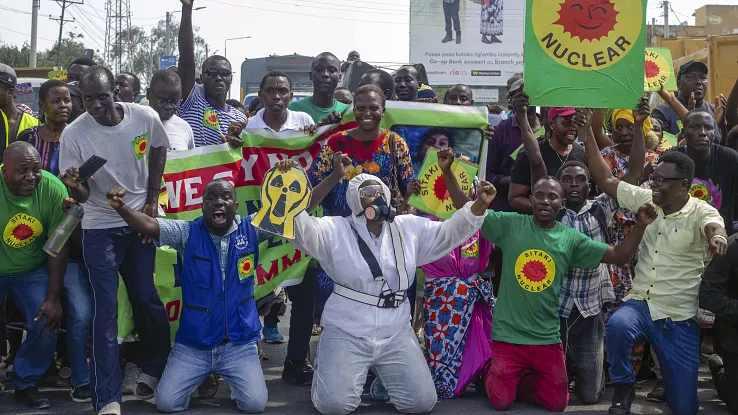An area has been set aside in Kenya’s southern county of Kilifi for the construction of the country’s first nuclear facility. The project on the coast of the Indian Ocean is expected to be fully operational by 2034.
But it has faced fierce opposition.
On Friday (Oct. 11), a group of activists and environmentalists took to the streets.
“We say that this project has a lot of negative effects, there will be malformed children born out of this place, fish will die, and our forest Arabuko Sokoke, which is known to harbour birds from abroad, will be lost,” Francis Auma, a human rights activits said.
With an estimated budget of 500 billion Kenyan shillings ($3.9 billion).
The plant is expected to generate 1,000 megawatts of power and is part of Kenya’s long-term strategy to reduce its reliance on hydroelectric and fossil fuel energy sources.
“Five hundred Billion can generate more than two thousand megawatts. Why are we using it to generate only a thousand for only sixty years then it’s finished? While we have renewables that can last a lifetime for generations to come,” Executive Director Centre for Justice Governance and Environmental Action asked.
“We are here to oppose, we do not want the Kilifi County Government to be loaded with the burden of dealing with nuclear waste.”
Tourism and radiation risks
Kenya’s Nuclear Power and Energy Agency has repeatedly dismissed claims by residents and environmentalists that the proposed nuclear power plant will cause any harm to the residents in the area despite opposition from local communities and environmental groups.
Concerns have also been raised about the transparency of the decision-making process, with allegations that local residents have not been adequately informed or involved.
Residents of Uyombo, many of whom rely on fishing and tourism for their livelihoods, fear the environmental and health impacts of the plant, particularly the risk of radiation and the potential disruption of marine ecosystems.
Fishermen on a boat in the Indian Ocean off Kilifi, southern Kenya on Oct. 11, 2024. Cleared / AP
“I have been a fisherman for twenty years, I survive by fishing, and if they erect a nuclear plant here the breeding sites for fish will all be destroyed and won’t exist,” said local fisherman Timothy.
The Nuclear Power and Energy Agency has issued statements in the past, saying they will ensure the safety and security of people and the environment before they start construction in 2027.
